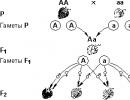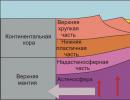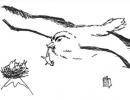Hovsepyan history of modern journalism. Hovsepyan R. P history of modern domestic journalism (Textbook). Educational and methodological complex for the course “history of domestic journalism of the twentieth century”
Hovsepyan R.P. History of modern domestic journalism (February 1917 - early 90s). - M.: Moscow State University Publishing House, 1999. - 304 p.
Abstract: The manual examines the most important features of the functioning of domestic journalism in the conditions of the multi-party system of the Soviet state and the beginning of democratic reforms during the transition period. The purpose of the manual is to understand the role of the media in the diverse processes of the socio-political and economic life of the country at various stages of its history.
For students of university journalism faculties and departments.
INTRODUCTION
CHAPTER 1. PRESS OF RUSSIA AFTER THE FEBRUARY BOURGEOIS-DEMOCRATIC REVOLUTION
Russian periodicals at the beginning of the 20th century
The February Revolution and the development of the press in Russia
Journalism in the political struggle of opposing sides
Print after the July events
CHAPTER 2. JOURNALISM OF THE FIRST DECADE OF SOVIET POWER (November 1917 - 1927)
Establishment of one-party Soviet journalism during the years of the civil war and foreign military intervention (July 1918–1920)
Domestic journalism during the period of liberalization of the Soviet regime (1921–1927)
CHAPTER 3. DOMESTIC JOURNALISM in the late 20s and 30s.
Development of the media structure
Journalism as a means of ideological and organizational support for the Bolshevik concept of socialist construction
Domestic journalism of the 30s.
CHAPTER 4. JOURNALISM ON THE EVE AND DURING THE GREAT PATRIOTIC WAR (1939–1945)
Soviet journalism in the pre-war years. Print and radio in the conditions of the Great Patriotic War
The main problems of the speeches of the Soviet press during the war years
Journalism during the Great Patriotic War
CHAPTER 5. JOURNALISM OF THE POST-WAR DECADE (1946-1956)
Development of the media system in the post-war years
The topic of restoration and further development of the national economy in the Soviet press
The topic of economic recovery and development in the press of the post-war years
CHAPTER 6. PRINT, TELEVISION AND RADIO OF THE SECOND HALF OF THE 50'S - MID 80'S.
Further development of the media structure
The topic of economic reform in the press
Journalism in captivity of voluntarism and relapses of the cult of personality
CHAPTER 7. MASS MEDIA OF THE SECOND HALF OF THE 80'S – EARLY 90'S.
Mass media in conditions of democratization and glasnost
Revival of the multi-party press in the country
Journalism and new political thinking
CHAPTER 8. JOURNALISM OF THE RUSSIAN FEDERATION (90s)
The Russian media system in the first half of the 90s.
Structure of the periodical press of the Russian Federation
Television broadcasting
Broadcasting
News agencies
Book publishers
Regional journalism
Journalism in the market conditions
Leading topics in the Russian media
Journalism of the Russian Federation and power structures
Russian Press on the Internet
INTRODUCTION
The history of modern domestic journalism at all stages of its journey is complex and contradictory. The essence of journalism is determined not by the sum of published publications and publications, different in nature and content, but by a dynamic, diverse process in which the publication, the publicist and society are in a very complex relationship, in constant movement and development.
The history of the mass media (media) was formed under the influence of numerous not only objective, but also subjective factors that influenced the content and nature of all its structural links. For decades, historical science, including historical and journalistic science, was under authoritarian pressure. She performed apologetic functions, depriving herself of the scientific principles of historicism, objectivity, and truthfulness. The historical and journalistic literature kept silent about everything that could cast a shadow on the “infallibility” of the party and its leaders, and sow doubt about the absolute correctness of their line.
Many works have been devoted to the construction of the Soviet press and its participation in the socio-political transformations of our society. Among them are “The Party and Soviet Press in the Struggle for the Construction of Socialism and Communism,” which was published in two editions in 1961 and 1966, “Print and the Construction of Communism” (M., 1969), “Soviet Journalism and the Communist Education of Working People” (M. ., 1979), “Multinational Soviet Journalism” (M., 1975). A prominent place in the historiography of modern domestic journalism was occupied by the works of: T. Antropov. The newspaper “Pravda” in the struggle for the victory of the October Revolution (M., 1954); R. Ivanova. Party-Soviet press during the years of extensive construction of socialism (1929–1937) (Moscow, 1977); I. Kuznetsov. Party and Soviet press during the years of socialist industrialization of the country (M., 1974); S. Matvienko. Party and Soviet press as a tool of socialist construction (1926–1932) (Alma-Ata, 1975); A. Mishuris. Print, born of October (M., 1968), etc. However, carrying rich factual material, these books are mostly written from the positions established in historical science of the “Short Course in the History of the All-Union Communist Party (Bolsheviks)”, directive documents of the CPSU and do not reflect today the realities of modern historical science.
The authors of many studies were deprived of access to even complete sets of newspapers, not to mention archival materials. The objective living conditions of Soviet society deprived them of the opportunity to recreate a true picture of the historical development of domestic journalism.
Books and studies were silent that the bourgeois-democratic state that arose for the first time in the history of Russia in February 1917 proclaimed freedom of speech, press and other manifestations of democracy. The new prospects provided an opportunity for the socialist parties of Russia to legalize their activities and begin organizing their network of periodicals.
It is necessary to restore the truth about the process of formation of the latest domestic journalism in the conditions of the multi-party system that took place after the victory of the October Revolution in young Soviet Russia.
Until recently, ideas about the activities of the Russian press in the first decade of Soviet power were fragmentary. It was not considered in the context of the socio-economic policy and military-communist ideology pursued at that time; it was hidden that even after the victory of the October Revolution, the administrative apparatus of the Provisional Government continued to operate, helping the Soviet government to avoid anarchy and paralysis in governing the country, which forced surplus appropriation led to a serious change in the principles of distribution, naturalization of wages, equalization. The principles of "war communism", propagated by the press, were presented as a definite plan for an accelerated transition to communist production and distribution. Blindly promoting Stalinism as the highest achievement of Marxist theoretical thought, it justified repression against those suspected of apostasy and accused of treason to the cause of communist construction. An in-depth understanding of the historical processes that actually took place helps to understand the role that the press played in the exceptionally rapid formation of the military-communist ideology, which had a detrimental impact on the forms and methods of governing the country over all subsequent decades.
The restructuring of political consciousness began with the report of N.S. Khrushchev at the 20th Congress of the CPSU, held in 1956, “On the cult of personality and its consequences.” However, the “thaw” period turned out to be short-lived. Analysis of the press of the late 60s and 70s. is increasingly asserting the idea that the coming to leadership of the country by L.I. Brezhnev led to a toughening of the political climate and intolerance of the authorities towards manifestations of free thought. Journalism moved away from a real assessment of the emerging socio-political contradictions.
1985 brought complex and still unresolved problems to Soviet society. Journalism, in the conditions of democratization of social life, glasnost, which opened the door to a little-known past, acquired new qualities and opportunities. The revival of a multi-party press has become a reality. Under the influence of democratization and openness in publications published after 1985, many secrets became apparent. The possibility of an objective assessment of the past has made it possible to make available to historical and historical-journalistic science what was previously kept silent or distorted.
Collections of journalistic materials contain a lot of new and instructive materials: “If according to conscience” (1988), “No other way is given” (1988), “Returned names”, in two books. (1989), “Pages of the history of the CPSU. Data. Problems. Lessons" (1988), "They Were Not Silent" (1989), "Our Fatherland. Experience of political history”, in two volumes (1991), N. Werth’s book “History of the Soviet State: 1900–1991” (1995), textbook “History of Contemporary Russian Journalism. February 1917 - early 90s" (1996), "Journalism of the late 20th century: lessons and prospects" (1998), etc.
The historiography of domestic journalism in a democratically oriented society is just taking shape. And yet, in recent years, many works have been published, the authors of which give an objective picture of the processes that took place in the 90s. in mass media. We are talking, in particular, about the books: “Russian Mass Media System” (1994), “Moral Principles of Television Journalism (Experience of a Code of Ethics)” (1994), “History of Contemporary Russian Journalism. Transition period (mid-80s - 90s)" (1996), "Five years of press freedom" (1996), "Mass information: production strategy and consumption tactics" (1996), "Judicial reform: problems of analysis and coverage . Discussions about legal journalism" (1996), "Media: systemic characteristics" (1996), "Journalism in transition: problems and prospects" (1996), etc.
Rethinking a number of problems in the history of modern Russian journalism has necessitated overcoming the elements of a dogmatic approach to considering the nature and content of the Soviet press at all stages of its activity. A decisive rejection of the subjectivist interpretations of the processes of formation and development of modern domestic journalism that have prevailed in historical and journalistic science opens up new horizons on this path.
A new reading and understanding of many documents and facts, an unbiased analysis of a newspaper sheet made it possible to return undeservedly forgotten names of publicists to domestic journalism, to get acquainted with their activities and literary skills. In the history of modern domestic journalism, the editorial and journalistic activities of N. Berdyaev, N. Bukharin, G. Plekhanov, P. Struve, N. Ustryalov, L. Trotsky, V. Chernov, M. Zoshchenko, K. Radek, P. Miliukov and other political figures and writers.
Hovsepyan or Hovsepyan(Armenian: Հովսեփյան) - Armenian surname. It is formed from a proper name and belongs to a common type of Armenian surnames.
Origin
After accepting Christianity, during the official baptism ceremony, each person received a baptismal name from the priest, which served only one purpose - to provide the person with a personal name. Baptismal names corresponded to the names of saints and were therefore common Christian names.
The basis of the Hovsepyan surname was the church name Joseph. Hovsep is the Armenian version of the Christian male name Joseph, which is of Hebrew origin and is translated as “God’s reward.”
One of the patrons of this name is the Monk Joseph of Volotsky. He lived in the 15th century, studied literacy at the Vozdvizhensky Monastery and was a famous polemicist. Joseph Volotsky was for some time the abbot of the monastery of Paphnutius Borovsky, but after some time he left the monastery and founded the famous Volokolamsk monastery. Hovsep eventually received the surname Hovsepyan. It is a wonderful monument of Armenian writing and culture.
Foreign language analogues
- rus. Osipov
- English Joseph(Joseph)
- German Joseph(Joseph)
Known media
- Hovsepyan, Avetis Vartanovich(b. 1954) - Soviet football player.
- Hovsepyan, Agvan Garnikovich(b. 1953) - Prosecutor General of the Republic of Armenia.
- Hovsepyan, Albert Azatovich(b. 1938) - public and political figure of the Abkhaz Republic.
- Hovsepyan, Andranik(b. 1966) - Soviet and Armenian football player.
- Ovsepyan, Vasily Andreevich(b. 1949) - Soviet and Russian journalist, editor, producer, poet.
- Ovsepyan, Irina Vasilievna (Irina Karenina) (b. 1979) - Russian poet, journalist, editor.
- Hovsepyan, Ron- President and CEO of Novell, Inc.
- Hovsepyan, Ruben Garnikovich(b. 1958) - Armenian politician and statesman.
- Hovsepyan, Ruben Georgievich(b. 1939) - Armenian writer and publicist. Member of the ARF.
To narrow down the search results, you can refine your query by specifying the fields to search for. The list of fields is presented above. For example:
You can search in several fields at the same time:
Logical operators
The default operator is AND.
Operator AND means that the document must match all elements in the group:
research development
Operator OR means that the document must match one of the values in the group:
study OR development
Operator NOT excludes documents containing this element:
study NOT development
Search type
When writing a query, you can specify the method in which the phrase will be searched. Four methods are supported: search taking into account morphology, without morphology, prefix search, phrase search.
By default, the search is performed taking into account morphology.
To search without morphology, just put a “dollar” sign in front of the words in a phrase:
$ study $ development
To search for a prefix, you need to put an asterisk after the query:
study *
To search for a phrase, you need to enclose the query in double quotes:
" research and development "
Search by synonyms
To include synonyms of a word in the search results, you need to put a hash " #
" before a word or before an expression in parentheses.
When applied to one word, up to three synonyms will be found for it.
When applied to a parenthetical expression, a synonym will be added to each word if one is found.
Not compatible with morphology-free search, prefix search, or phrase search.
# study
Grouping
In order to group search phrases you need to use brackets. This allows you to control the Boolean logic of the request.
For example, you need to make a request: find documents whose author is Ivanov or Petrov, and the title contains the words research or development:
Approximate word search
For an approximate search you need to put a tilde " ~ " at the end of a word from a phrase. For example:
bromine ~
When searching, words such as "bromine", "rum", "industrial", etc. will be found.
You can additionally specify the maximum number of possible edits: 0, 1 or 2. For example:
bromine ~1
By default, 2 edits are allowed.
Proximity criterion
To search by proximity criterion, you need to put a tilde " ~ " at the end of the phrase. For example, to find documents with the words research and development within 2 words, use the following query:
" research development "~2
Relevance of expressions
To change the relevance of individual expressions in the search, use the " sign ^
" at the end of the expression, followed by the level of relevance of this expression in relation to the others.
The higher the level, the more relevant the expression is.
For example, in this expression, the word “research” is four times more relevant than the word “development”:
study ^4 development
By default, the level is 1. Valid values are a positive real number.
Search within an interval
To indicate the interval in which the value of a field should be located, you should indicate the boundary values in parentheses, separated by the operator TO.
Lexicographic sorting will be performed.
Such a query will return results with an author starting from Ivanov and ending with Petrov, but Ivanov and Petrov will not be included in the result.
To include a value in a range, use square brackets. To exclude a value, use curly braces.






